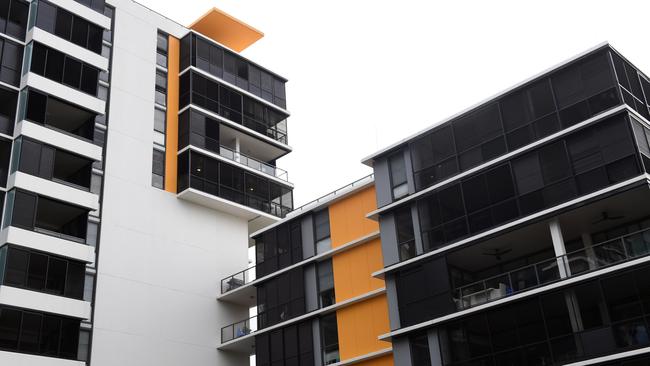The disturbing sign lurking past the housing boom
The unprecedented campaign to reduce dwelling prices is having an impact but there here is one development we need to watch.

And it would appear that the small fall has extended to cottages in many Sydney suburbs. For the moment, the boom is over but there are wider more disturbing signs, so Treasurer Scott Morrison needs to be very careful what he does in the budget.
Almost certainly that weakness will spread to Melbourne where the apartment market is more complex because of the large number of apartments bought by overseas Chinese requiring settlement before June 30. I will return to this issue later.
If the apartment weakness is sustained and deepens, cottages will not escape, particularly in outer areas of capital cities where there is abundant supply.
The fall in the Sydney apartment market at this stage is minor, around one or two per cent but Meriton reports an unprecedented development — one in four local and overseas Chinese who pay a deposit on an apartment exercise their ‘return’ right and ask for their deposit to be refunded a day or two later.
They are clearly nervous. And that nervousness is multiplied by the fact that three major apartment land sites which were bought by Chinese developers are now back on the market.
Two are on the north side of Sydney — the Channel Nine site in Willoughby and a property in St Leonards. The third is south of Sydney’s CBD. Those sales underline the nervousness in the Chinese community, currently the main buyers of Sydney and Melbourne apartments.
As my readers will know. I have been very apprehensive at the combined power of the many and varied attacks on the residential property market. I fear the bank regulators and the government may have very little understanding of the forces they are unleashing.
We have endless mention of bubbles: banks must curb investor lending, particularly the previously popular interest only loans; interest rates are rising on investor loans; the government is clamping down on foreign buyers and the Federal Treasurer is promising a further, unspecified attack on the market to make “housing more affordable”.
Local banks, having indicated two or thee years ago they would fund Chinese off-the-plan buyers, are now refusing to lend to them while it is getting harder and harder to get money out of China. The ALP is promising a king hit to the dwelling market with negative gearing limited to new dwellings thereby creating two markets. Combine all those onslaughts and it’s no wonder that fear of this is driving away buyers in the bellwether Sydney apartment market. And if Donald Trump succeeds in sucking global money back to the US and boosts the US dollar (sending our dollar down and interest rates up), we will have a huge problem.
If we make housing more affordable by slashing prices by 10 or 20 per cent, we will create a banking crisis of great magnitude and a recession would be inevitable. We might even experience something far worse because housing has driven the Australian economy, including boosting consumer confidence among homeowners.
The Australian is publishing a digital series on housing affordability and have asked me set out how I would bring first home buyers back into the market. As I explain in that commentary, I think we are approaching a point where action is possible. Right now a majority of young people have stopped looking.
There is another development which we need to watch. A number of Chinese banks are watching their good clients suffering in Australia because they can’t get funding to complete off-the-plan purchases — particularly in Melbourne.
There is an embryonic proposal for several China banks to open in Australia to fund Chinese buyers. The Chinese government has little knowledge of the overseas activities of many Chinese citizens. This way they would learn a lot. It would also help solve the Melbourne crisis and would give confidence to Chinese currently buying off the plan for settlement in two or three years.
And remember that while the populations of Melbourne and Sydney keep rising as a result of migration, there will continue to be an increasing demand for accommodation. If we stop developing it will create a serious shortage pushing up rents.
And Australia can learn from Vancouver where government taxes on foreign real estate purchases reduced prices last year as sales volumes plunged.
Much of the Vancouver development boom was funded by non-bank lenders. This week one of the biggest of those lenders, Home Capital Group, ran into severe liquidity problems and is attempting an expensive rescue package. In Australia, our banks rather than non-banks funded the developers (although non-banks are now looking to rescue Chinese apartment buyers who can’t get funding).
However, the forces that pushed up the Vancouver market are returning, led by the Chinese education boom. Vancouver rivals Australia in overseas student education.
The price falls appear to have stopped partly because supply has been constrained. Trying to make dwellings affordable by collapsing the market is not good policy. There are better ways.






The unprecedented campaign to reduce dwelling prices is starting to have a real impact. The best forward indicator, Sydney apartment prices, has started to ease and sales volumes are falling.